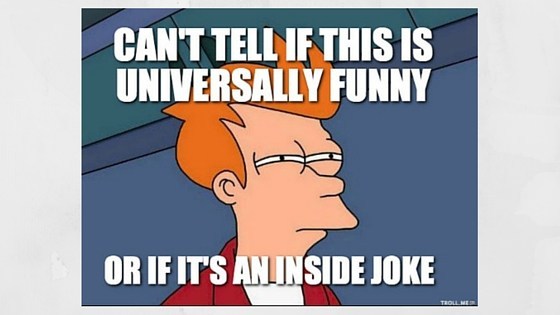Stand-up comedy jokes can be broken down in multiple ways: mechanical vs. organic, one-liners vs. storytelling, observational vs. experiential, current event vs. evergreen material, and local vs. universal. Comedians are exposed to these different styles as they learn to write comedy. Click here for an article on how to write stand-up comedy. In this article you’ll learn how to use local and universal humor effectively.
Universal humor is jokes that can be told to any audience anywhere in the world. Local humor simply refers to material that is limited geographically in where you can use them. The material can make a large impact in a specific area but can rarely be used outside of that area.
Both of these types of jokes have a different function. Universal humor is about what we all have in common. It plays on the common nature of people. It’s power comes from the “sameness” of audiences. Local humor works in the opposite direction: it’s power comes from the uniqueness of an audience.
What is the purpose of local humor if you can’t use it anywhere else? Why should a comedian write jokes specifically for a region? The answer is that local humor creates powerful rapport with the audience that can’t be found anywhere else. When you use local humor, you are “building a community” out of the audience. There’s an “inside joke” that those from elsewhere wouldn’t get. There’s also the added bonus of performing material that the local audience is intimately aware of. Instead of speaking to “general tendencies,” you’re meeting the audience where they are and acknowledging what makes them unique. Local humor is a great way of making an audience feel special, which is why it builds rapport so quickly.
Early in a set it’s generally a good idea to incorporate local humor. This builds rapport with the audience and makes you seem like “one of them.” After a comedian has established common ground the comedian can then move to more generic material (though this can be done in other ways as well).
The biggest risk a comedian takes when using local material is that local humor is generally less tested than universal material. Oftentimes, local humor is written the day of the show when the comedian arrives in the city. This means starting out a show with jokes that are untested (or, at best, not as tested as a comedian’s universal jokes).
There are two main strategies that a comedian can use for incorporating local humor into a set: They can either lead off the show with it or they can use it early in the set, but not as an opener. This comes down to a judgment call. If the joke is well written then it might serve well as an opener. If the comedian is unsure about it, they should probably use it early in the set and open up with material that’s been tested. This way the comedian can build momentum with their usual opener and then segue into “riskier” material later on.
To see just how powerful local humor can be, watch this video. You’ll notice that I start off the show with “tried-and-true material” and then segue into local humor. I chose this strategy because I was at the Great American Comedy Festival, a high-pressure show where every joke counts. Watch the audience’s reaction as I go from universal humor to local humor. They go from “enjoying the show” to having an instant connection right away. You’ll also notice numerous applause breaks as I do.
[embedyt] https://www.youtube.com/watch?v=xjTt616cVkM[/embedyt]
Writing local humor is much like writing any other material: it begins with observation. When you are in a new town you’re sure to see something that makes that town unique. In the video link, the “uniqueness” of the town was that the grocery store had a shower in the bathroom. The humor came from me playfully questioning why.
“Playfully” is the key word here. Local humor can build tons of rapport, but if it comes off as condescending then it can just as easily break it. Local humor should almost always be positive. The only exception is widely-known local problems… such as crime in New York, for example.
Click here to learn more about how to write stand-up comedy, or 4 Ways to Become a More Creative Comedian. You can learn more about our Stand-Up Comedy Course or Creativity For Comedians Course here.
Jared Volle

